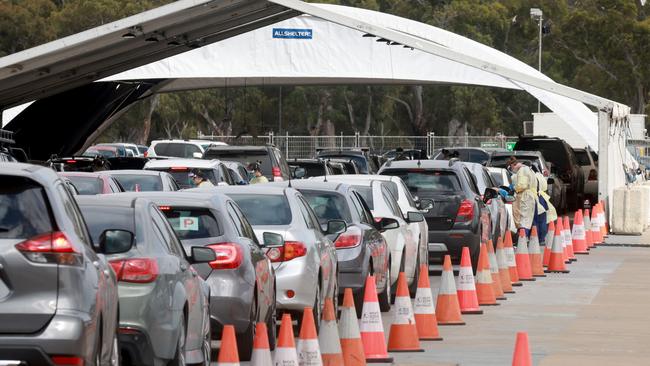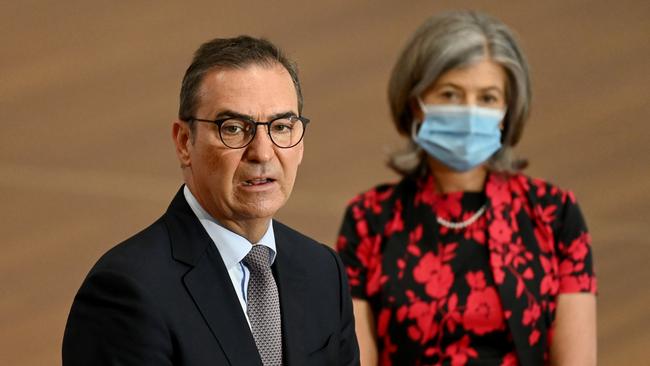David Penberthy: The politics of Spurrier’s advice could be massive
Pandemic political wisdom used to suggest the Premier would be in the box seat at the polls. But then we unlocked our borders, writes David Penberthy.
Opinion
Don't miss out on the headlines from Opinion. Followed categories will be added to My News.
In eight weeks’ time, South Australian voters will test out the theory that holding office during a pandemic hands an unassailable advantage to the government of the day.
For the past couple of years, as corona has up-ended our existence, all the opinion polls and election results in Australia have shown an advantage towards those in power. The size of that advantage has ranged from the significant to the staggering.
Governments of the day always benefit from a sense of voter insecurity, as it drives voter inertia. A good recent example is John Howard’s 2001 landslide, whom the polls had been heading towards defeat prior to September 11. At times of uncertainty voters feel it unwise to risk change.
There have been three state elections since the pandemic began, the first in Queensland in October 2020, when Labor was returned with a gain of four seats.
March last year saw the greatest drubbing in Australian history, with Labor’s Mark McGowan winning 53 of the 59 state seats, the Liberals plummeting from 11 to just two after their hapless former leader, Zak Kirkup, hilariously conceded defeat two weeks from polling day, and even lost his own seat.
And in the complex world of Tasmanian politics, the Liberals achieved the rarest of feats by being returned as a majority government last May.
Victoria’s Dan Andrews faces the polls this November and, despite having set a world record for locking up his own people, would seem assured of another term, in no small part due to the amateurism of his Liberal opponents. The latest of the scheduled elections will be NSW in March of next year.
In terms of its timing, there is a risk for Steven Marshall that March 19 is a date that will be unkind to his party and his premiership.
This is because the vibe of the times has moved beyond people being united by fear about the need to lockdown and avoid Covid, into a much more polarised discussion about how to get out of lockdowns and live with Covid.
In the past two months, SA went from nought to 100, metaphorically speaking, in terms of the presence of Covid in our community.
The trigger for that was the reopening of borders on November 23, the day after which the Omicron strain was reported to the World Health Organisation. It became a declared variant of concern a few days after that.
Like everyone else in SA, I have spent much of the past month lying low. I have done some time in iso, I have mates who have had or still have Covid, I did my time in the testing queues at Victoria Park and Aldinga. I had one of my kids declared a close contact then, mysteriously 36 hours later, no longer a close contact, as the rules puzzlingly changed.

My personal views on all this are: it is what it is. This is what emerging from a pandemic looks like. And having spent much of last year talking to parents whose kids were trapped interstate and border communities being belted by logically dubious rules, I am not going to now question the wisdom of doing something that let 10,000-odd people reunite.
And, more broadly, the entire point of the vaccination push surely was that the reward was a gradual return to normal life, whatever risks that entailed, as life always involves risk.
Many people have a much less laid-back take on things. Much of that stems from the circumstances of Professor Nicola Spurrier’s advice at the transition committee in early December that the safest way to stop the continued entry of Omicron was to shut the borders again.
The politics of this advice could be massive in the context of the election.
The government says that Prof Spurrier put that option forward as the most extreme measure, but was only saying it could be taken, not that it should be taken. The Opposition argues Prof Spurrier was advocating that option but was overruled.
Frankly, I can’t think of anything sillier than opening our borders on November 23 for just long enough to let Covid into the state, and then closing them again a couple of weeks later when it was already here.

The challenge has to be how to live with it, and that way clearly is through a combination of high vax rates and social caution. The political benefit of re-closing the borders would have been negligible and, probably, a negative. Had Marshall, Spurrier and Police Commissioner Grant Stevens all announced just before Christmas that the borders were slammed shut again, the key question would have been: why did we open them anyway? And the only stories in town would have involved families split again at Christmas, thanks to a broken promise of borders reopening.
Whether this will help Steven Marshall remains to be seen. The reality is, since November 23, he has gone from being a Premier who could say honestly that SA was doing better with all this than pretty any place on Earth, to saying that SA is now facing similar challenges to every country on Earth.
He has two added challenges. The first goes to how much residual anger there will be in eight weeks’ time about the chaos we saw over Christmas, and whether the testing queues and confusion over the validity of RAT tests pointed to a lack of preparedness by SA Health. The second challenge, and it may yet be a bigger one, will be how the return to school is managed, already showing signs of being a confusing and arbitrary shambles.
To borrow a phrase from the war in Iraq, winning the war against Covid has been easy for incumbent governments ruling a fearful and compliant populace.
Delivering the peace is a different proposition, especially when there are such divergent views on whether we are going too hard or too soft, too fast or too slow, and where everyone is sick of the whole damned thing anyway.





